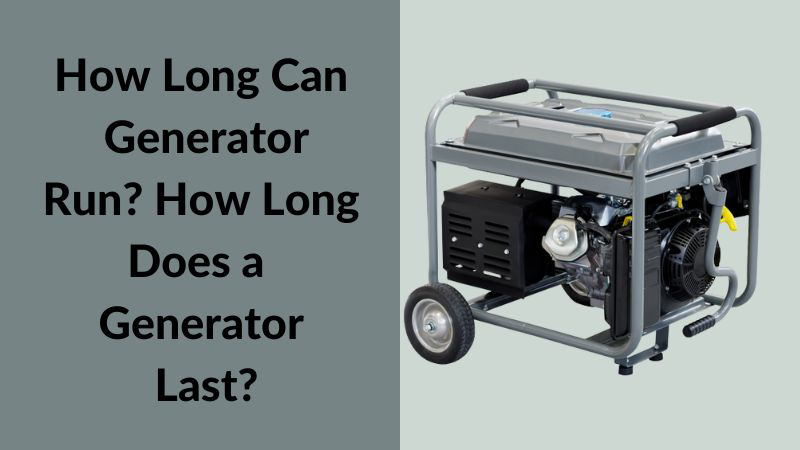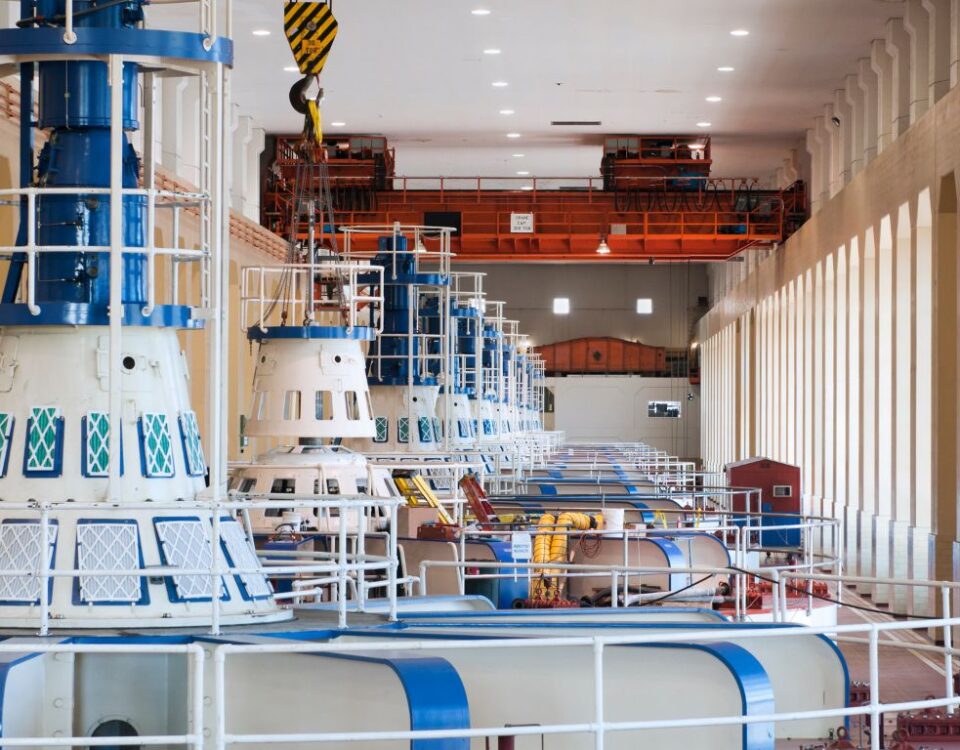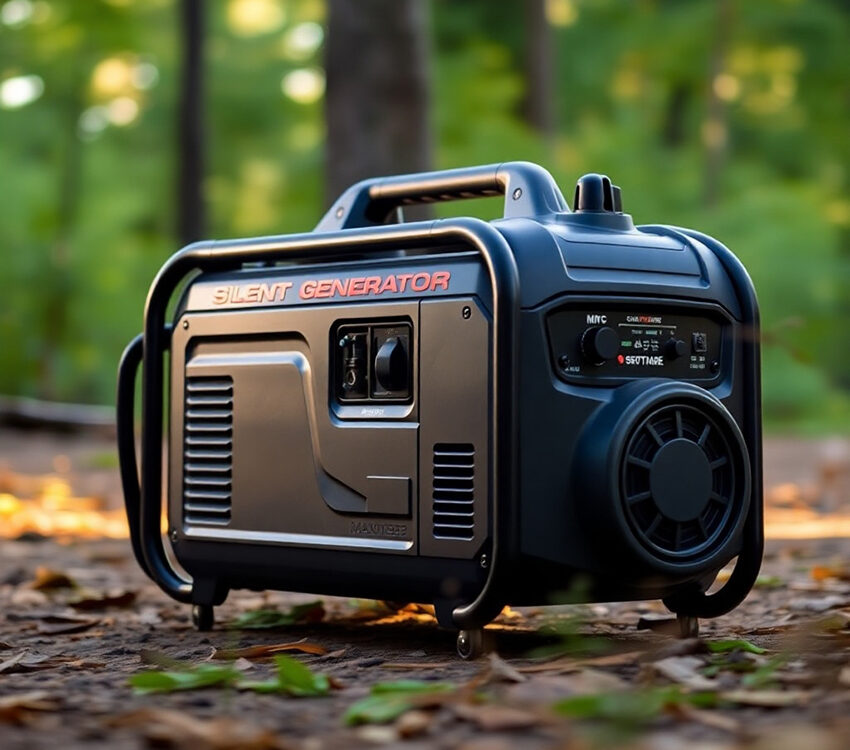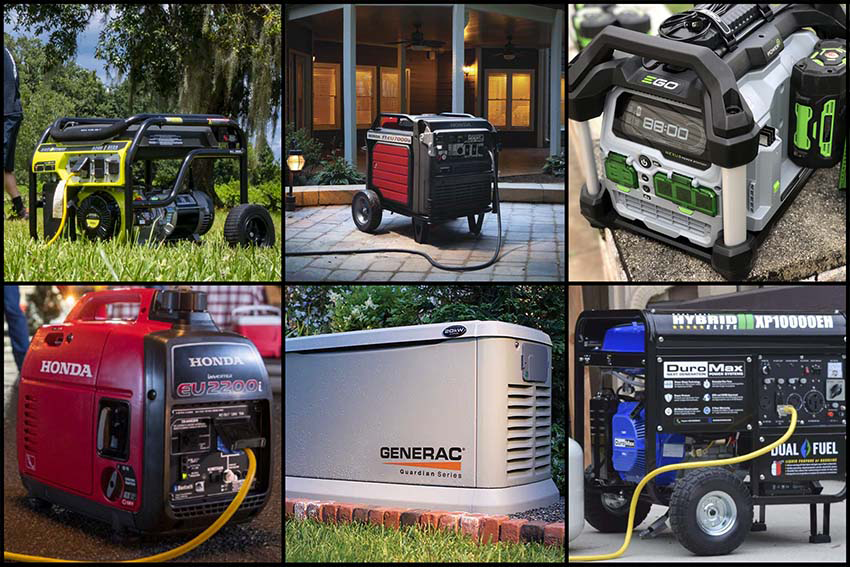
When considering the acquisition of a generator, whether for residential, commercial, or industrial use, two fundamental questions often arise: “How Long Can a Generator Run?” and “How Long Does a Generator Last?” These questions are vital in assessing a generator’s practicality and value over time. This comprehensive guide will explore these queries in depth, examining factors such as generator types, fuel efficiency, maintenance, and more.
“How Long Can a Generator Run?” – Delving into Generator Runtime
Understanding Generator Types and Their Impact on Runtime
The type of generator significantly influences generator runtime. The main categories include:
1. Portable Generators: Often fueled by gasoline or propane, these generators are designed for mobility and convenience. They are ideal for temporary power needs such as camping, outdoor events, or short-term power outages. Their fuel tank size typically limits the runtime of portable generators. For instance, depending on the load, a standard portable gasoline generator may run for 8 to 12 hours on a full tank.
2. Inverter Generators: A subset of portable generators, inverter generators are known for providing clean and stable power. They are particularly suitable for powering sensitive electronics. Inverter generators are more fuel-efficient and quieter than traditional portable models, offering extended runtimes. This efficiency is due to their ability to adjust the engine speed to the power demand, thus conserving fuel.
3. Standby Generators Are larger units installed outside a home or business, typically powered by natural gas or propane. Standby generators are designed to automatically kick in during a power outage, and their runtime is considerably longer, often limited only by their fuel supply. For example, a standby generator connected to a natural gas line can run if the supply is uninterrupted.
Factors Affecting Runtime
Several key factors influence the runtime of a generator:
Fuel Type: Gasoline, diesel, propane, and natural gas have different energy densities and availability, affecting how long a generator can operate before needing a refill.
Fuel Tank Size: Larger tanks enable longer runtimes, making the generator less portable.
Load Capacity: The amount of power being used (load) affects how quickly a generator consumes fuel. Operating a generator at total capacity will shorten its runtime compared to running it at a partial load.
Fuel Types and Their Impact on Runtime and Efficiency
Gasoline Generators
Gasoline is widely available and convenient, making it a popular choice for small portable generators. However, gasoline has a shorter shelf life and is less efficient than other fuel types, thus offering shorter runtimes. Environmental factors like temperature can also affect gasoline’s generator performance.
Diesel Generators
Diesel-powered generators are known for their efficiency and longer runtimes. They are a common choice for more extensive, stationary generators used in commercial and industrial settings. Diesel engines are generally more robust and can run for extended periods, especially when equipped with large fuel tanks.
Propane Generators
Propane generators offer a clean-burning alternative, producing fewer emissions than gasoline or diesel. They are quieter and can run for extended periods, depending on the size of the connected propane tank. Propane’s shelf life is longer than gasoline, making it a reliable fuel choice for infrequent use.
Natural Gas Generators
Natural gas generators are connected to a network, which makes them ideal for long-term use, especially for standby generators. They are quieter and produce fewer emissions than diesel generators but may require more complex installation and are dependent on the availability of a natural gas supply.
Maximizing Fuel Efficiency in Generators
Enhancing Efficiency Through Maintenance
Regular maintenance is critical for optimizing a generator’s fuel efficiency. It includes routine checks and replacements, such as changing oil and air filters and adequately tuning the engine. Keeping the generator in top condition extends its runtime and prevents potential malfunctions.
Load Management
Efficiently managing the load is another crucial aspect. Running a generator at or near its rated capacity ensures maximum efficiency, as underloading can lead to fuel wastage. Balancing the power needs with the generator’s capacity can significantly optimize fuel consumption.
Quality of Fuel
High-quality fuel and appropriate fuel additives can improve a generator’s performance and efficiency. Using clean, water-free diesel for diesel generators is crucial, as impurities can clog filters and reduce efficiency. Ensuring the fuel is fresh and properly stored for gasoline models can prevent performance issues.
Technological Advances
Incorporating technologies like Automatic Voltage Regulators (AVRs) can also enhance efficiency. AVRs maintain a consistent output, reducing the strain on the generator and enabling more efficient fuel use.
“How Long Does a Generator Last?” – Prolonging Generator Lifespan
Impact of Usage and Maintenance
The lifespan of a generator is primarily determined by how it is used and maintained. Regular maintenance is paramount, including timely oil changes, filter replacements, and general upkeep. A generator running in harsh conditions or at maximum capacity regularly may have a shorter lifespan compared to one used moderately and maintained well.
Storage and Environmental Factors
Proper storage plays a significant role in extending a generator’s lifespan. Storing a generator in a dry, clean, and temperature-controlled environment can prevent rust and component degradation. Protection from extreme weather and proper ventilation are also important.
Professional Installation and Regular Inspections
Ensuring professional installation and conducting regular inspections can prevent operational issues and prolong the generator’s life. Regular inspections by a qualified technician can identify and resolve potential problems before they lead to significant repairs.
Conclusion: Optimizing Generator Use for Maximum Benefit
When addressing the questions “How Long Can a Generator Run?” and “How Long Does a Generator Last?”, it’s clear that factors such as the type of generator, its fuel source, maintenance practices, and usage patterns are vital determinants. Understanding these aspects is crucial for anyone considering a generator for their power needs.
To maximize the benefits of a generator, one should focus on selecting the right type based on their specific requirements, paying attention to fuel efficiency, and adhering to a strict maintenance schedule. Proper handling, usage within recommended capacities, and awareness of environmental factors also play a crucial role in enhancing a generator’s runtime and lifespan.
Generators are invaluable tools in ensuring uninterrupted power supply, and with the proper knowledge and practices, their benefits can be fully realized. Understanding and applying these principles for emergency backup, recreational use, or industrial applications will ensure your generator serves you well for many years.
Certainly! I’ll add an FAQ section to the article, addressing common questions about generator runtime and lifespan.
Frequently Asked Questions
The average runtime of a portable gasoline generator typically ranges from 8 to 12 hours on a full tank, depending on the generator’s size and the load it’s powering.
Yes, the type of fuel can impact a generator’s lifespan. Diesel generators, for instance, often have longer lifespans than gasoline generators due to their fuel efficiency and robust construction.
Regular maintenance schedules vary by generator type and usage. Still, performing essential maintenance, like oil and filter changes, is generally recommended every 100 to 200 hours of operation or at least once a year.
It’s most efficient to run a generator near its rated capacity. Running a generator at a significantly lower load than its capacity can lead to fuel wastage and may impact the generator’s performance over time.
Standby generators, especially those connected to a natural gas line, can run as long as the fuel supply is uninterrupted. It can range from several days to weeks, making them ideal for prolonged power outages.
The Generator Flow Team specializes in providing expert guidance on selecting, maintaining, and operating generators. Their role is to ensure users get the most efficient and reliable performance from their generators.
Extending the lifespan of your generator involves regular maintenance, using quality fuel, operating it within recommended capacities, and storing it properly when not in use.
Yes, inverter generators produce cleaner, more stable power with lower Total Harmonic Distortion (THD), making them suitable for sensitive electronics like computers and audio equipment.
Store your generator in a dry, clean area. If it’s not used for an extended period, drain the fuel, run the carburetor dry, and disconnect the battery if applicable.
Environmental factors like extreme temperatures, humidity, and exposure to the elements can affect a generator’s performance and longevity. Proper storage and usage in recommended conditions are essential.





